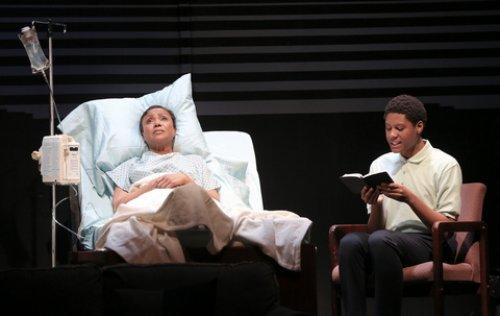Surely Goodness and Mercy
An after-school movie with its heart in the right place but the story is rather thin and predictable.

Jay Mazyck and Courtney Thomas in a scene from Keen Theater Company’s production of Chisa Hutchinson’s “Surely Goodness & Mercy” (Photo credit: Carol Rosegg)
[avatar user=”Victor Gluck” size=”96″ align=”left”] Victor Gluck, Editor-in-Chief[/avatar]Chisa Hutchinson’s Surely Goodness and Mercy has its heart in the right place but as produced by Keen Company at the Clurman Theatre it is not a play at all but an after school movie script. We know we are in trouble when we see seven sets side by side on stage on three levels when we first enter the theater. Jessi D. Hill has directed her adept cast to believable characterizations but the script is so short at 73 minutes (plus a totally unnecessary intermission) and the 30 scenes so brief (some no more than four exchanges) that we never learn enough about them. It is as though the whole story has been told in a kind of shorthand and we are expected to fill in the dots.
Set in Newark, New Jersey, in 2019, Surely Goodness and Mercy’s hero is Tino, a 12-year-old precocious orphan who has a photographic memory and whose hobby is reading the Bible which he has with him at all times. As his mother has died four years earlier in a shooting he witnessed, he lives with her sister Alneesa who resents having to take care of him. We later discover that she is an abusive parent but no one at his school seems to notice. Although laughed at by other students (who we only hear about) he is befriended by Deja, a girl in his English class, who thinks he is different from the other students and might need a friend, when he asks her about a medical incident she had the day before.
In the cafeteria, he has daily conversations with the elderly and cantankerous lunch lady, Bernadette, who seems to take an interest in him, but has her own untreated medical problems which appear to be getting worse. When she disappears from the school cafeteria, he finds out that she is in the hospital being treated for Multiple Sclerosis. He goes to pay her a visit after school and discovers that she will not be able to afford further treatment when she gets out. When he reports back to Deja, she suggests they start a GoFundMe page to help pay for her seeing a neurologist. Things go beautifully at first and then things go south pretty fast.

Brenda Pressley and Jay Mazyck in a scene from Chisa Hutchinson’s “Surely Goodness & Mercy” (Photo credit: Carol Rosegg)
The title of the play is taken from Psalm 23: “Surely goodness and mercy shall follow me all the days of my life, and I will dwell in the house of the Lord forever.” The play’s theme which works out a little too neatly in the play with its feel good ending is that if you do good for others, you will be amply repaid. We are never told whether it was his mother’s death or something else that caused Tino to begin reading the Bible from cover to cover on his own even though he admits he doesn’t understand it all.
The publicity material for the play indicates that it is “set in an under-funded public school in Newark” but except for the fact that Tino and Deja’s English teacher doesn’t entirely know her grammar, there is no other evidence of this. There are several glaring holes in the play that defy belief, but this might be meant to be taken as a fantasy.
While Hutchinson’s characterizations of her seven characters are thin, the cast of the Keen production has fleshed them out admirably. Brenda Pressley is commanding in a rather stereotyped role as the older lady with the sharp tongue and the heart of gold. While Jay Mazyck is much too tall (at 19) to play a 12-ear-old boy, he has a great deal of charm and plays Tino with much emotional intensity. As his Aunt Alneesa, Sarita Covington at first seems to find his precocity for his age annoying and then lets us see her dark side. Courtney Thomas is quite engaging as the more forward student Deja who can see more in Tino than most people. She is also convincing as the offstage voice of the English teacher who finds Tino insubordinate due to his vast knowledge. Cezar Williams is heard as both the Preacher and the school Principal, as well as appears on stage in the unspoken role as the school janitor.

Jay Mazyck and Sarita Covington in a scene from Chisa Hutchinson’s “Surely Goodness & Mercy” (Photo credit: Carol Rosegg)
Scenic designer Lee Savage’s rather cluttered stage fulfills the play’s need for many locations from Alneesa’s living room, to Tino’s bedroom, to Tino and Deja’s English class, the school cafeteria and lunch counter, to Bernadette’s bedroom to a Baptist church and a hospital room. While Devorah Kengmana’s lighting always directs our attention, the unneeded sets in each scene remain distractingly in our view. Nicole Wee’s costumes are blandly suitable without giving any of these people any salient characteristics, partly due to the fact that most of them are basically wearing uniforms. The sound design by Sadah Espii Proctor excellently solves the problem of the three unseen offstage but heard characters.
Playwright Chisa Hutchinson has a fine ear for dialogue and an excellent sense of fair play. Unfortunately, Surely Goodness and Mercy is rather unreal in its naïvete as well as having no dramatic arc. Under Jessi D. Hill’s astute direction, the play seem better than it is with performances that somewhat cover up the holes and inconsistencies in the script. The feel good ending will please some, while others will find it rather hard to believe.
Surely Goodness and Mercy (through April 13, 2019)
Keen Company
The Clurman Theatre at Theatre Row, 410 W. 42nd Street, in New York
For tickets, call 212-947-8844 or visit http://www.keencompany.org/sgm
Running time: 95 minutes with one intermission






Leave a comment